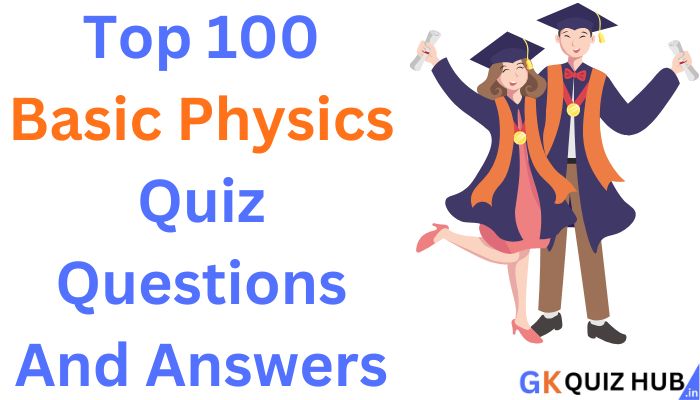नमस्ते दोस्तों!
आपका हमारे इस लेख में हार्दिक स्वागत है। आज हम आपके लिए भौतिक विज्ञान | भौतिक सामान्य ज्ञान | भौतिक विज्ञान प्रश्नोत्तरी (Basic Physics Quiz Questions And Answers) लेकर आए हैं, जो हिंदी में विकल्पों और उत्तरों के साथ प्रस्तुत किए गए हैं। यदि आप इस तरह की जानकारी रोजाना पाना चाहते हैं, तो हमारे टेलीग्राम या व्हाट्सएप चैनल को अवश्य ज्वॉइन करें। ये चैनल आपकी पढ़ाई और प्रतियोगी परीक्षाओं के लिए बेहद उपयोगी साबित हो सकते हैं।
इस प्रकार के सामान्य ज्ञान प्रश्न अक्सर परीक्षाओं और प्रतियोगिताओं में पूछे जाते हैं। साथ ही, इस लेख में आपको Basic Physics Quiz Questions And Answers in Hindi की PDF भी मिलेगी, जिसे आप डाउनलोड करके कहीं भी और कभी भी पढ़ सकते हैं। तो चलिए, आज के प्रश्नों की शुरुआत करते हैं!
General Physics Basics
- Q: What is the SI unit of force?
A: Newton (N) - Q: What is the speed of light in a vacuum?
A: 3×108 m/s3 \times 10^8 \, \text{m/s} - Q: What is the formula for calculating work done?
A: W=F×d×cosθW = F \times d \times \cos\theta - Q: What is the value of acceleration due to gravity on Earth?
A: 9.8 m/s29.8 \, \text{m/s}^2 - Q: What is the SI unit of energy?
A: Joule (J)
Chemistry Notes in Hindi for Class 12 pdf
Motion and Mechanics
- Q: What is Newton’s First Law of Motion?
A: An object at rest stays at rest, and an object in motion stays in motion unless acted upon by an external force. - Q: What is the formula for velocity?
A: v=dtv = \frac{d}{t} - Q: Define momentum.
A: Momentum is the product of an object’s mass and velocity (p=mvp = mv). - Q: What is the principle of conservation of momentum?
A: The total momentum of an isolated system remains constant if no external forces act on it. - Q: What is kinetic energy?
A: Energy possessed by a body due to its motion.
100 Biology Questions and Answers in Hindi
Thermodynamics
- Q: What is the First Law of Thermodynamics?
A: Energy cannot be created or destroyed, only transferred or converted. - Q: What is absolute zero?
A: The temperature at which molecular motion stops (-273.15 \,^\circ \text{C} or 0 K0 \, \text{K}). - Q: What is the SI unit of temperature?
A: Kelvin (K) - Q: What is specific heat capacity?
A: The amount of heat required to raise the temperature of 1 kg of a substance by 1°C. - Q: What is the formula for calculating heat transfer?
A: Q=mcΔTQ = mc\Delta T
Waves and Sound
- Q: What is the speed of sound in air at room temperature?
A: Approximately 343 m/s343 \, \text{m/s}. - Q: What is frequency?
A: The number of wave cycles per second. - Q: What is the unit of frequency?
A: Hertz (Hz) - Q: What is the difference between transverse and longitudinal waves?
A: In transverse waves, particles move perpendicular to wave direction; in longitudinal waves, particles move parallel. - Q: What is the wavelength of a wave?
A: The distance between two consecutive crests or troughs.
Electricity and Magnetism
- Q: What is Ohm’s Law?
A: V=IRV = IR (Voltage = Current × Resistance) - Q: What is the SI unit of electric current?
A: Ampere (A) - Q: What is a conductor?
A: A material that allows the flow of electric charge. - Q: What is a voltmeter used for?
A: Measuring voltage. - Q: Define magnetic flux.
A: The total magnetic field passing through a given area.
Optics
- Q: What is refraction?
A: The bending of light as it passes from one medium to another. - Q: What is Snell’s Law?
A: n1sinθ1=n2sinθ2n_1 \sin\theta_1 = n_2 \sin\theta_2 - Q: What is the speed of light in glass?
A: Approximately 2×108 m/s2 \times 10^8 \, \text{m/s}. - Q: What is total internal reflection?
A: When light reflects entirely within a medium without escaping. - Q: What are the primary colors of light?
A: Red, green, and blue.
Advanced Topics
- Q: What is the formula for Einstein’s mass-energy equivalence?
A: E=mc2E = mc^2 - Q: What is Planck’s constant?
A: 6.63×10−34 Js6.63 \times 10^{-34} \, \text{Js} - Q: What is a photon?
A: A particle of light or quantum of electromagnetic radiation. - Q: What are quarks?
A: Fundamental particles that make up protons and neutrons. - Q: What is the Standard Model?
A: A theory describing the fundamental forces and particles in the universe.
Here’s a continuation of the 100 Basic Physics Quiz Questions and Answers across various topics:
Lucent GK Book in English Pdf Free 2024 & 2025 In Hindi
Gravitation
- Q: Who formulated the law of universal gravitation?
A: Isaac Newton - Q: State the formula for the gravitational force.
A: F=Gm1m2r2F = G \frac{m_1 m_2}{r^2} - Q: What is the value of the gravitational constant (GG)?
A: 6.674×10−11 N\cdotpm2/kg26.674 \times 10^{-11} \, \text{N·m}^2/\text{kg}^2 - Q: What causes tides on Earth?
A: Gravitational pull of the Moon and Sun. - Q: What is escape velocity?
A: The minimum velocity needed for an object to escape a planet’s gravitational field.
Modern Physics
- Q: Who is known as the father of quantum mechanics?
A: Max Planck - Q: What is a black hole?
A: A region in space where gravity is so strong that nothing, not even light, can escape. - Q: What is Heisenberg’s uncertainty principle?
A: It states that it is impossible to know both the position and momentum of a particle precisely at the same time. - Q: What is a semiconductor?
A: A material with conductivity between that of a conductor and an insulator. - Q: What is the photoelectric effect?
A: Emission of electrons when light shines on a material.
Energy and Power
- Q: What is the SI unit of power?
A: Watt (W) - Q: Define potential energy.
A: Energy stored due to an object’s position or configuration. - Q: What is the formula for power?
A: P=WtP = \frac{W}{t} - Q: What is the energy transformation in a hydroelectric dam?
A: Potential energy → Kinetic energy → Electrical energy - Q: What is mechanical energy?
A: The sum of kinetic and potential energy in a system.
Heat and Temperature
- Q: What is conduction?
A: Transfer of heat through direct contact of particles. - Q: What is convection?
A: Transfer of heat through the movement of fluids. - Q: What is radiation?
A: Transfer of heat in the form of electromagnetic waves. - Q: What is latent heat?
A: Heat absorbed or released during a phase change without a temperature change. - Q: What is the triple point of water?
A: The temperature and pressure at which water coexists as solid, liquid, and gas.
Waves
- Q: What is amplitude?
A: The maximum displacement of a wave from its rest position. - Q: Define resonance.
A: When a system oscillates with maximum amplitude at its natural frequency. - Q: What are standing waves?
A: Waves that remain in a constant position, typically formed by interference. - Q: What is the Doppler effect?
A: The change in frequency of a wave due to relative motion between the source and observer. - Q: What is the relationship between wave speed, frequency, and wavelength?
A: v=fλv = f \lambda
Electric Circuits
- Q: What is a resistor?
A: A component that resists the flow of electric current. - Q: What is an electric circuit?
A: A closed loop that allows the flow of electric current. - Q: What is a short circuit?
A: A fault in an electrical circuit causing low resistance and high current flow. - Q: What is the formula for electrical power?
A: P=VIP = VI - Q: What is capacitance?
A: The ability of a system to store electric charge.
Magnetism
- Q: What is the unit of magnetic field strength?
A: Tesla (T) - Q: What are ferromagnetic materials?
A: Materials that can be magnetized, like iron, cobalt, and nickel. - Q: What is electromagnetic induction?
A: The process of generating electric current from a changing magnetic field. - Q: Who discovered electromagnetic induction?
A: Michael Faraday - Q: What is a solenoid?
A: A coil of wire that generates a magnetic field when current flows through it.
Relativity
- Q: Who proposed the theory of relativity?
A: Albert Einstein - Q: What is time dilation?
A: Time appears to move slower in a stronger gravitational field or at high speeds. - Q: What is spacetime?
A: The four-dimensional continuum of space and time. - Q: What is the twin paradox?
A: A thought experiment in relativity where one twin ages slower due to traveling at high speeds. - Q: What is relativistic mass?
A: Mass increases with the velocity of an object as it approaches the speed of light.
Quantum Physics
- Q: What is wave-particle duality?
A: Particles like electrons exhibit both wave and particle properties. - Q: What is the Schrödinger equation?
A: A mathematical equation describing quantum states. - Q: What are virtual particles?
A: Temporary particles that appear in quantum fields. - Q: What is superposition?
A: A quantum system can exist in multiple states simultaneously until observed. - Q: What is quantum entanglement?
A: A phenomenon where particles remain interconnected and share states instantaneously.
Astrophysics
- Q: What is a light-year?
A: The distance light travels in one year. - Q: What is the Big Bang Theory?
A: The theory that the universe originated from a singularity approximately 13.8 billion years ago. - Q: What is dark matter?
A: An unseen substance that makes up most of the universe’s mass. - Q: What is a supernova?
A: A massive explosion of a star. - Q: What is the event horizon of a black hole?
A: The boundary beyond which nothing can escape.
Miscellaneous
- Q: What is inertia?
A: The resistance of an object to change its state of motion. - Q: What is a scalar quantity?
A: A quantity with magnitude only. - Q: What is a vector quantity?
A: A quantity with both magnitude and direction. - Q: What is torque?
A: A force that causes rotation. - Q: What is a gyroscope?
A: A device used to measure or maintain orientation.
Experimental Physics
- Q: What is a control variable?
A: A variable kept constant in an experiment. - Q: What is an accelerometer?
A: A device that measures acceleration. - Q: What is Hooke’s Law?
A: F=kxF = kx, where FF is force, kk is the spring constant, and xx is displacement. - Q: What is Brownian motion?
A: Random movement of particles in a fluid. - Q: What is a spectrometer?
A: An instrument that measures properties of light.
Final Five Questions
- Q: What is the SI unit of pressure?
A: Pascal (Pa) - Q: What is Archimedes’ principle?
A: A body submerged in a fluid experiences an upward buoyant force equal to the weight of the displaced fluid. - Q: What is a pendulum?
A: A weight suspended from a pivot that swings due to gravity. - Q: What is centripetal force?
A: The force that keeps an object moving in a circular path. - Q: What is entropy?
A: A measure of disorder or randomness in a system.
निष्कर्ष Basic Physics Quiz Questions And Answers
इस लेख में हमने आपको Basic Physics Quiz Questions And Answers in Hindi के साथ उत्तर प्रदान किए हैं। ये प्रश्न आपके ज्ञान को बढ़ाने के साथ-साथ प्रतियोगी परीक्षाओं और अन्य प्रतियोगिताओं में आपकी तैयारी को मजबूत बनाने में मदद करेंगे।
यदि आप नियमित रूप से इस तरह के ज्ञानवर्धक प्रश्न पढ़ना चाहते हैं, तो हमारे टेलीग्राम और व्हाट्सएप चैनल से जुड़ें। वहाँ आपको परीक्षा से संबंधित महत्वपूर्ण सामग्री और प्रश्नों की PDF भी मिलेंगी, जिन्हें आप डाउनलोड करके आसानी से पढ़ सकते हैं।
हम आशा करते हैं कि यह लेख आपके लिए उपयोगी सिद्ध होगा और आपकी तैयारी को नई ऊंचाइयों तक पहुंचाएगा। और नई नई जानकारी के लिए आप हमारे वेबसाईट को देखते रहिई, आपकी सफलता हमारी प्रेरणा




